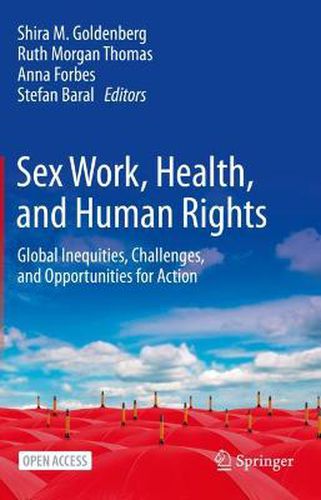Readings Newsletter
Become a Readings Member to make your shopping experience even easier.
Sign in or sign up for free!
You’re not far away from qualifying for FREE standard shipping within Australia
You’ve qualified for FREE standard shipping within Australia
The cart is loading…






This title is printed to order. This book may have been self-published. If so, we cannot guarantee the quality of the content. In the main most books will have gone through the editing process however some may not. We therefore suggest that you be aware of this before ordering this book. If in doubt check either the author or publisher’s details as we are unable to accept any returns unless they are faulty. Please contact us if you have any questions.
This open access book provides a comprehensive overview of the health inequities and human rights issues faced by sex workers globally across diverse contexts, and outlines evidence-based strategies and best practices.
Sex workers face severe health and social inequities, largely as the result of structural factors including punitive and criminalized legal environments, stigma, and social and economic exclusion and marginalization. Although previous work has largely emphasized an elevated burden and gaps in HIV and sexually transmitted infection (STI) services in sex work, less attention has been paid to the broader health and human rights concerns faced by sex workers. This contributed volume addresses this gap.
The chapters feature a variety of perspectives including academic, community, implementing partners, and government to synthesize research evidence as well as lessons learned from local-level experiences across different regions, and are organized under three parts:
Burden of health and
human rights inequities faced by sex workers globally, including
infectious diseases (e.g., HIV, STIs), violence, sexual and reproductive
health, and drug use
Structural
determinants of health and human rights, including legislation, law
enforcement, community engagement, intersectoral collaboration, stigma,
barriers to health access, im/migration issues, and occupational safety
and health Evidence-based
services and best practices at various levels ranging from individual and
community to policy-level interventions to identify best practices and avenues
for future research and interventions
Sex Work, Health, and Human Rights is an essential resource for researchers, policy-makers, governments, implementing partners, international organizations and community-based organizations involved in research, policies, or programs related to sex work, public health, social justice, gender-based violence, women’s health and harm reduction.
$9.00 standard shipping within Australia
FREE standard shipping within Australia for orders over $100.00
Express & International shipping calculated at checkout
This title is printed to order. This book may have been self-published. If so, we cannot guarantee the quality of the content. In the main most books will have gone through the editing process however some may not. We therefore suggest that you be aware of this before ordering this book. If in doubt check either the author or publisher’s details as we are unable to accept any returns unless they are faulty. Please contact us if you have any questions.
This open access book provides a comprehensive overview of the health inequities and human rights issues faced by sex workers globally across diverse contexts, and outlines evidence-based strategies and best practices.
Sex workers face severe health and social inequities, largely as the result of structural factors including punitive and criminalized legal environments, stigma, and social and economic exclusion and marginalization. Although previous work has largely emphasized an elevated burden and gaps in HIV and sexually transmitted infection (STI) services in sex work, less attention has been paid to the broader health and human rights concerns faced by sex workers. This contributed volume addresses this gap.
The chapters feature a variety of perspectives including academic, community, implementing partners, and government to synthesize research evidence as well as lessons learned from local-level experiences across different regions, and are organized under three parts:
Burden of health and
human rights inequities faced by sex workers globally, including
infectious diseases (e.g., HIV, STIs), violence, sexual and reproductive
health, and drug use
Structural
determinants of health and human rights, including legislation, law
enforcement, community engagement, intersectoral collaboration, stigma,
barriers to health access, im/migration issues, and occupational safety
and health Evidence-based
services and best practices at various levels ranging from individual and
community to policy-level interventions to identify best practices and avenues
for future research and interventions
Sex Work, Health, and Human Rights is an essential resource for researchers, policy-makers, governments, implementing partners, international organizations and community-based organizations involved in research, policies, or programs related to sex work, public health, social justice, gender-based violence, women’s health and harm reduction.